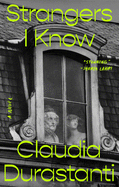
"The story of a family is more like a map than a novel," Claudia Durastanti's narrator reflects in Strangers I Know, "and an autobiography is the summation of all the geologic ages you've passed through." The story Durastanti charts in her English PEN Award-winning fourth novel is full of discord, and the Italian author seems at home in the unsettled territory between these genres. Across 40 chapters arranged by theme rather than strict chronology, she examines language as "a technology that reveals the world," grappling with the power--and limitations--of the written word to make the strangeness of one's own life legible.
Durastanti's nearly unnamed narrator (readers learn only in passing that her name is also Claudia) is born to deaf Italian parents. They give conflicting accounts of their first meeting, and they found in each other "someone not interested in facing disability with bravery or dignity, but with recklessness and oblivion." Durastanti traces the reverberations of their tempestuous marriage and spectacular divorce across her narrator's youth and young adulthood, exploring how they influence her relationship to language and eventually her maturation as a writer. Every engagement with art and popular culture becomes an act of translation: she appreciates the music of John Cage for its "attention to everything diverging from our normal way of hearing"; elsewhere, she considers the aesthetic shortcomings of television closed captioning. The author handles these discursive passages with fearless poetic verve, making them some of the most resonant in the book. Incisive and profound, Strangers I Know is a tremendous work by Durastanti and translator Elizabeth Harris. --Theo Henderson, bookseller at Ravenna Third Place Books in Seattle, Wash.

